|
Featured picture tools: |
These featured pictures, as scheduled below, appeared as the picture of the day (POTD) on the English Wikipedia's Main Page in April 2009. Individual sections for each day on this page can be linked to with the day number as the anchor name (e.g. [[Wikipedia:Picture of the day/April 2009#1]] for April 1).
You can add an automatically updating POTD template to your user page using {{Pic of the day}} (version with blurb) or {{POTD}} (version without blurb). For instructions on how to make custom POTD layouts, see Wikipedia:Picture of the day.Purge server cache
April 1
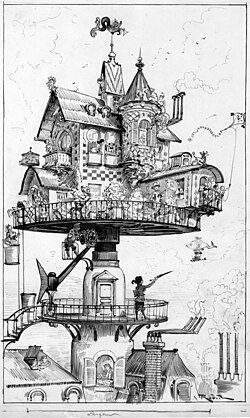
|
A typical 20th-century aerial rotating house, as drawn by Albert Robida. The drawing shows a dwelling structure in the scientific romance style elevated above rooftops and designed to revolve and adjust in various directions. An occupant in the lower right points to an airship with a fish-shaped balloon in the sky, while a woman rides a bucket elevator on the left. Meanwhile, children fly a kite from the balcony as a dog watches from its rooftop doghouse. Artist: Albert Robida
Recently featured:
|
April 2
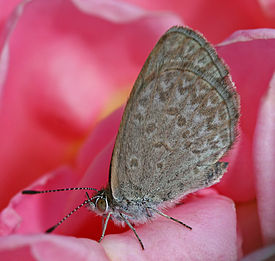
|
A Common Grass Blue (Zizina labradus), a small Australian butterfly. This specimen, perched on a rose, is approximately 10 millimetres (0.4 in) in size. Females generally have a larger wingspan compared to males (23 and 20 mm or 0.9 and 0.8 in respectively). Photo credit: John O'Neill
Recently featured:
|
April 3

|
This photograph, entitled Dalí Atomicus, explores the idea of suspension, depicting three cats flying, a bucket of thrown water, and Salvador Dalí in mid air. The title of the photograph is a reference to Dalí's work Leda Atomica which can be seen in the right of the photograph behind the two cats. This is an early unretouched version where the suspension wires are still visible. Photo credit: Philippe Halsman
Recently featured:
|
April 4

|
Experimental continuous tracked landing gear on a Convair B-36 Peacemaker. The gear was intended to spread out the weight of the B-36 to allow it to land on softer runways, but was abandoned in favor of the conventional four-wheeled bogie. Photo credit: United States Air Force
Recently featured:
|
April 5

|
A doctor administers a typhoid fever vaccination at a rural school in San Augustine County, Texas, April 1943. Vaccination is the administration of antigenic material (the vaccine) to produce immunity to a disease. It is considered to be the most effective and cost-effective method of preventing infectious diseases. Photo credit: John Vachon, FSA
Recently featured:
|
April 6
|
An F/A-18 Hornet performs an automated aerial refueling operation on another. This was part of a study by the Dryden Flight Research Center to evaluate the ability of the F/A-18 as an in-flight refueling tanker to develop analytical models for an automated aerial refueling system for unmanned aerial vehicles. The project is documenting how an operational tanker's drogue basket responds when in the presence of the receiver aircraft. Film credit: NASA
Recently featured:
|
April 7
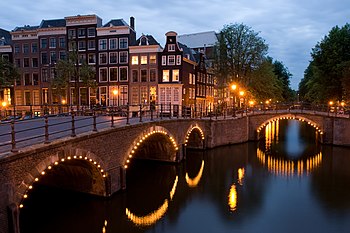
|
The Keizersgracht ("Emperor's Canal" in Dutch), the widest of the three major canals of Amsterdam, at dusk. Located in the city centre, it is named after Maximilian I, Holy Roman Emperor. The more than one hundred kilometers of canals in Amsterdam, about 90 islands and 1,500 bridges have led the city to being termed the "Venice of the North". Photo credit: Massimo Catarinella
Recently featured:
|
April 8

|
A male Gadwall (Anas strepera), a common and widespread duck that breeds in the northern areas of Europe and Asia and central North America. This dabbling duck is strongly migratory and winters further south than its breeding range, from coastal Alaska south into Central America and eastward to the East Coast of the United States. Photo credit: Mdf
Recently featured:
|
April 9

|
|
Joss Bay Beach, near Broadstairs, a seaside resort on the Isle of Thanet, in Kent, England, on a summer day. The name was derived from the “broad stairs” carved in the chalk cliff, that led from the sands to the 12th century shrine of St Mary situated above the cliffs. Photo credit: David Iliff
Recently featured:
|
April 10

|
Watson and the Shark, a 1778 painting by John Singleton Copley depicting the rescue of the future Lord Mayor of the City of London, Brook Watson, from a shark attack in Havana, Cuba. The attack occurred when Watson was 14 years old and serving as a crew member on a cargo ship. In 1774, after Watson arrived in London, he and Copley became friends. Watson likely commissioned the original version of this painting, but Copley would eventually create two additional copies.
Recently featured:
|
April 11

|
A 1918 stereograph of the Wawona Tree, a famous giant sequoia (227 ft or 69 m in height and 90 ft or 27 m in circumference) that stood in Mariposa Grove, Yosemite National Park, California, United States. The tunnel was cut through the tree in 1881, enlarging an existing fire scar, making the tree a popular tourist attraction. Often travelers would come to have their picture taken either driving through the tunnel or standing underneath the tree. When it collapsed in 1969, its estimated age was 2,300 years. Photo credit: Keystone View Co.
Recently featured:
|
April 12

|
|
A full-length photograph of the Shroud of Turin which is said to have been the cloth placed on Jesus at the time of his burial. The shroud bears the image of a man who appears to have been physically traumatized in a manner consistent with crucifixion. Radiocarbon dating in 1988 by three independent teams of scientists determined that it was made during the Middle Ages, long after Jesus lived. However, it is possible that the tested sample was not a part of the original cloth. The shroud was also damaged by a fire in the Late Middle Ages which could have added carbon material, resulting in a higher radiocarbon content and a later calculated age.
Recently featured:
|
April 13

|
The common scorpionfly (Panorpa communis) is a species of scorpionfly native to Western Europe. It has a black and yellow body, with a reddish head and tail, and a wingspan of about 35 mm (1.4 in). The male has a pair of claspers at the end of its tail, giving it a scorpion-like appearance, although there is no stinger. Photo credit: Richard Bartz
Recently featured:
|
April 14

|
A lithograph print of the assassination of Abraham Lincoln, which took place on April 14, 1865, when the U.S. President was shot while attending a play at Ford's Theatre in Washington, D.C. From left to right: Major Henry Rathbone, Rathbone's fiancée Clara Harris, First Lady Mary Todd Lincoln, Abraham Lincoln, and the assassin John Wilkes Booth. Image credit: Currier and Ives
Recently featured:
|
April 15

|
American stand-up comedian Josh Blue, the winner of the fourth season of the reality show Last Comic Standing. Blue has cerebral palsy and many of his jokes center on living with his disability, how he deals with it and how other people view him. He coined the term "palsy punch" during his final set of the final round of the show, when he said that the palsy punch is effective in a fight because "first of all, they don't know where the punch is coming from, and second of all, neither do I." Photo credit: Bryce Boyer
Recently featured:
|
April 16

|
The "Darnley portrait", the official portrait of Elizabeth I of England, likely painted from life ca. 1575–76. This portrait is the source of a face pattern which would be used and reused for authorized portraits of Elizabeth into the 1590s, preserving the impression of ageless beauty. It features a crown and sceptre on a table beside the queen, and was the first appearance of these symbols of sovereignty separately used as props (rather than worn and carried) in Tudor portraiture, a theme that would be expanded in later portraits. Artist: Unknown
Recently featured:
|
April 17

|
Crewmen aboard the USS Iwo Jima, prime recovery ship for the Apollo 13 mission, hoist the command module aboard ship on April 17, 1970, after the spacecraft splashed down in the South Pacific. The crew successfully returned to Earth after a critical malfunction en route to the Moon and the mission eventually became known as a "successful failure". Commander Jim Lovell's radio transmission, "Houston, we've had a problem", spawned the misquoted phrase in popular culture, "Houston, we have a problem". Photo credit: NASA
Recently featured:
|
April 18

|
A Silvereye (Zosterops lateralis) perched on a blooming Cestrum species. The Silvereye is a very small passerine bird (~12 cm (4.7 in) in length) native to the Australasia region. Silvereyes are omnivorous but have a particular fondness for fruit. Some orchardists, grape growers, and home gardeners regard them as a pest particularly as, being so small, Silvereyes simply ignore bird nets, popping in and out through the netting at will. Photo credit: Noodle snacks
Recently featured:
|
April 19

|
A fire breather in the "Jaipur Maharaja Brass Band" of India. Fire breathing, which is said to have originated in India, is the act of creating a large flame by spraying, with one's mouth, a flammable liquid upon an open flame. A number of legendary creatures are said to possess innate capabilities for fire breathing, most notably dragons. Photo credit: Luc Viatour
Recently featured:
|
April 20

|
An 1876 advertisement for the Great Western Railway for travel via the Niagara Falls Suspension Bridge, the world's first working railway suspension bridge, which connected Niagara Falls, Ontario, Canada, to Niagara Falls, New York, United States. The bridge was operational from 1855 to 1897, and was replaced by the Whirlpool Rapids Bridge. Image credit: Clay, Cosack & Co.
Recently featured:
|
April 21

|
The flower of a Cymbidium Clarisse Austin 'Best Pink' cultivar of boat orchid, one of the most popular and desirable orchids in the world. One feature that makes the plant so popular is that it can survive during cold temperatures (as low as 7 °C or 45 °F). Orchid hobbyists in temperate climates appreciate their ability to bloom in winter, when few other orchids are blooming. Only a few Cymbidium species are commonly grown in nurseries, due to the popularity of hybrids. Photo credit: Derek Ramsey
Recently featured:
|
April 22

|
Two pot-bellied pigs sleeping. This breed of domestic pig belongs to the same species as the Wild Boar and the common farm pig (Sus domestica), and originated in Vietnam. Most adult pot-bellied pigs are about the size of a medium- or large-breed dog, though their bodies are denser at a weight of 60 to 300 pounds (27 to 136 kg). Photo credit: Joaquim Alves Gaspar
Recently featured:
|
April 23
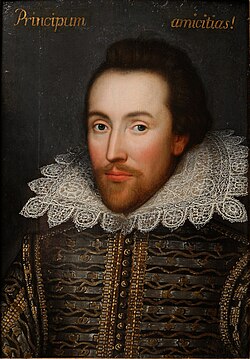
|
The Cobbe portrait is a 17th century panel painting recently claimed to be of William Shakespeare. Support for this theory is drawn from the inheritance of the portrait by the Cobbe family from Shakespeare's patron, Henry Wriothesley, 3rd Earl of Southampton, and its resemblance to the Janssen portrait, a long-standing candidate to be a portrait of Shakespeare. Scientific examination has dated the panel and paint used to Shakespeare's lifetime. These claims, however, have been met with considerable skepticism from both Shakespeareans and art experts, some of whom believe that both the Cobbe and Janssen portraits represent Sir Thomas Overbury. The portrait goes on public display for the first time today in Shakespeare's birthplace, Stratford-upon-Avon, England.
Recently featured:
|
April 24
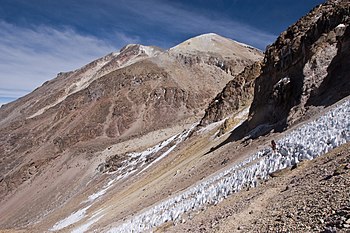
|
Summit of the Chachani (on the left, elevation 6,057 metres or 19,872 feet), and Mt. Fatima (highest point), the highest of three volcanoes above Arequipa, Peru. The path to reach the summit can be seen, going almost to the top of Mt. Fatima first. Because this region is extremely arid, the mountain is almost entirely devoid of snow. Photo credit: Alexandre Buisse
Recently featured:
|
April 25

|
|
A panoramic view across the interior of the Australian Synchrotron (a subatomic particle accelerator) in Clayton, Victoria. Dominating the image is the storage ring, showing the optical diagnostic beamline at front right. In the middle of the storage ring is the booster synchrotron and linac. The yellow, green and red magnets on the trolley (front left) are a demonstration of the bending and focusing magnets used in the storage ring to produce the synchrotron radiation and maintain the electron beam. Photo credit: John O'Neill
Recently featured:
|
April 26

|
A female sand wasp (Bembix oculata) in its habitat. They are so named because they nest in sandy places, using the front legs to dig holes in which they store prey (usually flies) to feed their larvae. Photo credit: Joaquim Alves Gaspar
Recently featured:
|
April 27
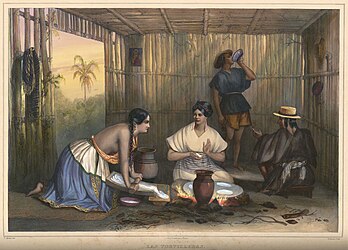
|
An 1836 lithograph of Mexican women making tortillas, which are an unleavened flatbread and have been a staple of Mesoamerican food for centuries, dating to approximately 10,000 BCE. The name "tortilla" comes from the Spanish word "torta", which means "round cake". Artist: Carl Nebel
Recently featured:
|
April 28

|
An ijazah certifying competency to teach Islamic calligraphy, 1206 AH/1791 CE. The ijazah qualification, which indicates that one has been authorized by a higher authority to transmit a certain subject or text of Islamic knowledge, appeared in the 9th century and is considered to be the first academic degree. Image credit: 'Ali Ra'if Efendi
Recently featured:
|
April 29

|
An 1835 lithograph of Red Jacket, a Native American Seneca chief. He took this name (one of several) from an embroidered coat given to him by the British Army for his wartime services. The Senecas took the British side during the American Revolution, although Red Jacket later supported the U.S. in the War of 1812. Red Jacket became famous as an orator, speaking for the rights of his people. In 1792, he played a prominent role in negotiations with the new U.S. government. During these negotiations, he received a special "peace medal", a large oval silver plate showing an image of President George Washington on the right hand side shaking his hand engraved upon it. Red Jacket wore this on his chest (shown here) in every portrait painted of him thereafter. Artist: Henry Corbould, printed by Charles Joseph Hullmandel
Recently featured:
|
April 30

|
|
A panoramic view of the River Thames as it flows through the town of Richmond, located in the Borough of Richmond upon Thames in London, England. The river is a major area for leisure: The Thameside walkway provides access to residences, pubs and terraces, and various parks, lanes and footpaths through the town. Photo credit: David Iliff
Recently featured:
|
Picture of the day archives and future dates